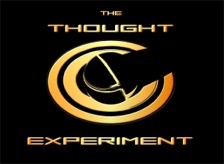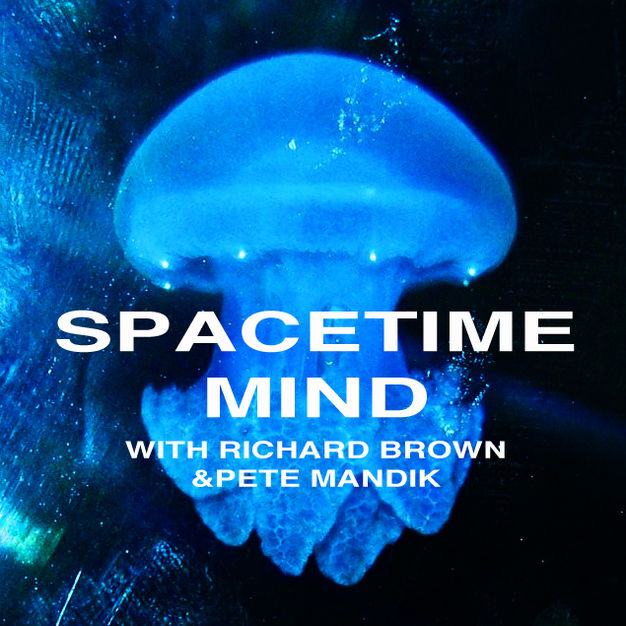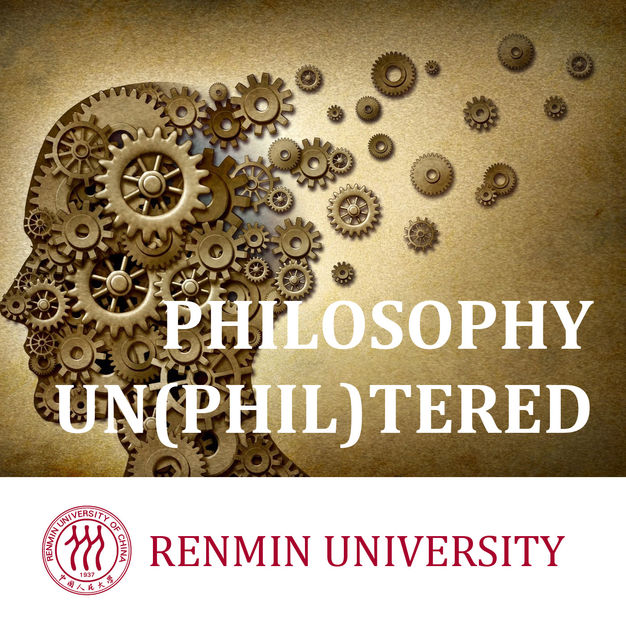
You've Got It All Wrong
Thought Experiment Media
A weekly show about philosophy, science and the history of ideas from the Allen Brothers and Mark Sanders (best known to listeners as “America’s Sweetheart”). If you can imagine what would happen if Plato and Carl Sagan were guests on The Daily Show, then you have a pretty good idea of what’s going on here. Each week the trio provides an overview of a philosophical topic, a history of the problem and insights into contemporary thinking. They also take a behind-the-scenes look at the philosophers who came up with these ideas: usually they are kind of nuts (the guy who pioneered Utilitarian ethics had his body mummified and put on display at his college). If you wish your Philosophy 101 course had been more informative, less boring and taught by a professor who drank during class, then this podcast is for you.
- 54 minutes 39 secondsEp 22: Paradoxes Part II - Buford, Beethoven and Brothers
All handsome people enjoy a good paradox, so we decided to open up our paradox box again and pick out a few new ones for this episode. A lot of paradoxes have to do with the way language works, and how it fails us when we try to describe certain aspects of our experience. Often a series of statements seems to make sense when we analyze them in a vacuum, only to find that they don’t square with our everyday experience of the world around us. This is true in the Unexpected Hanging Paradox, which shows us that there is something wrong with the way we use simple words like “surprise.” In the Paradox of Analysis, we find that statements can be true or informative, but not both. And in the Bootstrap Paradox, we learn that the way we talk about causality can lead us in circles. Along the way we discover Delaware has some dark secrets, that Beethoven might never have existed and that our podcasting studio is now protected by armed guards and is only accessible by footbridge.
16 November 2015, 3:43 am - 43 minutes 43 secondsEp 21: Halloween Spooktacular—From Aardvark to Zombies!
Are zombies real? Could we all be zombies? On this special Halloween episode, we raise topics from the dead—specifically we’re reanimating our discussion of philosophical zombies from Episode 2. This time we take a closer look at qualia, a technical term for the experiences that are unique to us as individuals, such as “what it’s like for Mark to be scared by Gremlins.” Can qualia be explained in physical terms? Do they even exist? We dig up the work of philosophers such as Daniel Dennett, David Chalmers and G.F. Stout, and continue to ponder why so many philosophers shun their first names. Hit play … if you dare!
2 November 2015, 3:09 am - 43 minutes 39 secondsEp 20: Listener Mail - Sam Harris and the Ethics of Jabba's Droid Dungeon
In this episode we sort through some listener mail and attempt to answer your most pressing questions. A number of fans wanted to know why we didn’t mention Sam Harris’s book, “The Moral Landscape,” in our episode about moral realism. In order to answer that question, we had to watch his TED talk and then wing it. We also revisit some questions about the ethics of robot torture, and take a closer look at what’s happening in Jabba the Hutt’s droid dungeon. And last but not least, we wrestle with one listener’s emphatic need to know if America's Sweetheart is actually Australian.
26 October 2015, 7:01 am - 53 minutes 36 secondsEp 19: Ontological Argument for the Existence of God - The Everything Bagel
In this episode we jump around in time. From a conversation last year at a bagel shop, to Paco’s college years and all the way back to the middle ages. What do an everything bagel and the ontological argument for the existence of God have to do with each other? We discuss Saint Anselm’s extremely analytical argument for God and how his contemporary, Gaunilo of Marmoutiers, challenged it directly with an equally objective critique. We follow this argument all the way up modern day with the work of Alvin Plantinga. And it wouldn’t be one of our shows without a fascinating Bertrand Russell anecdote. Also find out about the latest exciting developments in the world of Michigan-based philosophy. A jam-packed episode.
19 October 2015, 7:01 am - 45 minutes 24 secondsEp 18: Moral Realism - Vampire Socrates
Are moral statements objectively true? When we say “stealing for fun is wrong,” are we making a factual claim about the world, or are we just voicing an opinion? Many philosophers, known as moral realists, have attempted to show that “stealing for fun is wrong” is true in exactly the same way that “two plus two equals four” is true. In this episode we examine two different types of moral realism, and take a look at the arguments for and against. Along the way try to figure out why so many philosophers hate their first names and who wins the prize for nicest philosopher ever. We also answer some reader mail about robot torture and give Anne Rice some free ideas for philosopher/vampire plotlines.
12 October 2015, 7:01 am - 56 minutes 11 secondsEp 17: Rationalism vs. Empiricism - Kevin Spacey Eyes
Do we learn everything we know from the world around us, or are there some things we learn independently of our sensory experiences? Rationalists argue that some of our knowledge, like concepts in algebra and trigonometry, is innate or intuitive. We know that two plus two equals four independently of our specific observations of the world around us. Empiricists argue that all knowledge comes from experience, and that even basic principles of mathematics would be unknowable to us if it weren’t for our interactions with the external world. In this episode we provide an overview of both positions and talk about philosophers who have lined up on both sides of the debate. We also provide a complete guide to casting an action adventure movie about British Empiricism and Continental Rationalism (spoiler alert: John Locke is portrayed by Adrien Brody). We answer some listener mail about fax machines and personal identity, and unlock the secret of Mark’s favorite doughnut (spoiler alert: it’s the Bear Claw).
5 October 2015, 7:01 am - 48 minutes 47 secondsEp 16: Descriptivist Theory of Names - The Howie Mandel Effect
This is our second show about how proper names work (check out episode 10 for part one). It’s an important topic because much of philosophy is built around the concept of assigning truth values to sentences such as “Socrates is mortal.” And we can’t know if that sentence is true or false unless we know what “Socrates” means. In this episode we look at how Bertrand Russell developed his Descriptivist theory of names, and how that theory came to dominate the philosophy of language for much of the 20th century. Along the way we speculate on the outcomes of hypothetical professional wrestling matches, including Frege vs. Mill and Zappa vs. Hogan. We get yet another dose of Mark’s research on weird names and learn about the books that Bertrand Russell while serving hard time in a British prison.
28 September 2015, 7:01 am - 48 minutes 11 secondsEp 15: Possible Worlds - Better call Saul Kripke
You might say it’s possible that Tom Selleck could have played Indiana Jones. But what does that actually mean? Can you prove that this statement is true or false in the some way? In today’s episode we look at how truth functional statements can be evaluated in the context of more than just our world. We look at the role of Possible Worlds and Modal Logic through the work of Saul Kripke, Ruth Barcan Marcus and David Lewis with a little help from the creative vision of Steven Spielberg and George Lucas. How do we describe the world where the role of Indiana Jones, not might have been, but actually was played by the actor Tom Selleck? And how do we tell the difference between a possible world and the alternate reality of the Multiverse? We also discuss some listener mail about our use of the term ‘Handsome’ and we get a unique first look at Chad’s personal definition of the three types of luck.
Music and Sound Effects Attribution:
Gun noise http://soundbible.com/2091-MP5-SMG-9mm.html Whip Crack http://soundbible.com/1375-Whip-Crack.html Music: https://www.facebook.com/musicbyscottbuckley21 September 2015, 7:01 am - 1 hour 4 minutesEp 14: Paradoxes - Infinite Oranges, Paradise Trunk
Paradoxes have confounded philosophers and handsome people for ages, perhaps since the dawn of language. The oldest ones we have on record come from the ancient Greeks. These paradoxes are thousands of years old, yet many of them remain unresolved. In this show we examine famous paradoxes from the ancient Greek philosophers Zeno and Eubulides, as well as a modern paradox from Bertrand Russell. Some of these paradoxes purport to have solutions, while others remain unsolved. We examine the paradoxes and the people who developed them, and vote on whether or not they’ve been solved. Along the way we find out whether or not Mark could beat a tortoise in a foot race, imagine a world where beards are illegal and wonder what it’s like to have a famous philosopher bite off your ear.
14 September 2015, 7:01 am - 51 minutes 15 secondsEp 13: Categorical Imperative - From Prussia With Love
One of the great debates in philosophy is whether or not moral rules are created by humans or exist independently from us as absolute truths. The German philosopher Immanuel Kant believed that we could discover objective moral principles, and his theory of the Categorical Imperative was meant to give us a framework for distinguishing between right and wrong. In this episode we give an overview of the Categorical Imperative, including some famous thought experiments that argue both for and against Kant’s idea. We also learn about Kant’s rules for throwing a good dinner party, marvel at Mark’s absolute lack of knowledge about all things Scottish and answer some listener mail about our tagline.
7 September 2015, 7:01 am - 1 hour 9 minutesEp 12: Personal Identity - What happens on Risa stays on Risa
If all of the cells in your body get replaced every ten years, will you still be the same person a decade from now? If all of your memories get erased today, will you still be the same person tomorrow? In this episode we take a look at tough questions about personal identity and the nature of the self. We review the work of some of the great philosophers who have tackled these problems, including John Locke, Thomas Reid and Derek Parfit. Along the way we also learn a lot about Star Trek’s greatest hairstylist, read some poems about fish and learn how to pronounce teletransportation with an Australian accent.
31 August 2015, 5:27 am - More Episodes? Get the App
Your feedback is valuable to us. Should you encounter any bugs, glitches, lack of functionality or other problems, please email us on [email protected] or join Moon.FM Telegram Group where you can talk directly to the dev team who are happy to answer any queries.
 Overthought & Understated
Overthought & Understated
 The Thought Experiment
The Thought Experiment
 Minerva
Minerva
 Blog - Space Time Mind
Blog - Space Time Mind
 Six Pack Philosophy
Six Pack Philosophy
 Philosophy Un(phil)tered
Philosophy Un(phil)tered